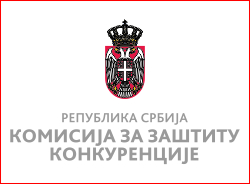 The Commission for Protection of Competition initiated ex officio proceedings against the company Dobergard DOO Beograd, for the purpose of investigating the concentration which was carried out even though it was not approved in accordance with the Law on Protection of Competition, and which, according to the reasonable assumption, resulted from the acquisition of control by company Dobergard over the company Sparta Security DOO and over the company Protecta Group DOO Beograd.
The Commission for Protection of Competition initiated ex officio proceedings against the company Dobergard DOO Beograd, for the purpose of investigating the concentration which was carried out even though it was not approved in accordance with the Law on Protection of Competition, and which, according to the reasonable assumption, resulted from the acquisition of control by company Dobergard over the company Sparta Security DOO and over the company Protecta Group DOO Beograd.
In the investigation proceedings, the Commission will evaluate the criteria prescribed by the Law (Art. 19 of the Law on Protection of Competition) which determine the permissibility of a concentration, and in particular, the circumstance that the concentrations under review had been implemented, but not notified, which was the obligation of market participants. The law stipulates that concentrations of market participants are allowed, unless they would significantly restrict, distort or prevent competition on the market of the Republic of Serbia, and especially if that restriction, distortion or prevention would be the result of creation or strengthening of a dominant position.
The Commission will determine the important facts, evidence and other elements on which it will base its decision regarding the possible determination of a measure of protection of competition, that is, a measure of deconcentration.
By way of conclusions on initiation of the proceedings, all persons who possess data, documents or other relevant information which can contribute to the establishment of the correct facts in these proceedings are invited to submit them without delay to the Commission for Protection of Competition at the address 25/IV Savska Street, Belgrade.
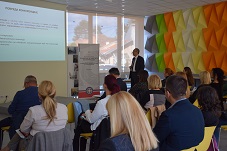 The Commission for the Protection of Competition in cooperation with the Chamber of Commerce and Industry of Serbia (CCIS) held a one-day presentation of the Guidelines for the development of a business compliance program with regulations on the protection of competition in the Regional Chamber of Commerce of Moravica and Raška District – office in Čačak.
The Commission for the Protection of Competition in cooperation with the Chamber of Commerce and Industry of Serbia (CCIS) held a one-day presentation of the Guidelines for the development of a business compliance program with regulations on the protection of competition in the Regional Chamber of Commerce of Moravica and Raška District – office in Čačak.
The presentation was the second in a series that will be held throughout Serbia with the aim of familiarizing market participants with the rules in the field of competition protection and guidelines for the development of the Business Compliance Program with regulations on competition protection that the Commission published in December last year.
The current practice of the Commission for Protection of Competition shows that violations of competition often occur due to lack or insufficient knowledge of market participants. On such basis, the need to raise the level of awareness of market participants about the need and ways to comply with regulations in the field of competition was recognized.
In order to assist market participants in the process of adopting a compliance program, the Commission briefly describes and clarifies these “steps” in these workshops and guidelines in the adoption of such programs as well as competition rules.
The presentation in Čačak was attended by more than 30 representatives of market participants and the expert public. The next workshop will be held on November 1 at the Regional Chamber of Commerce of the Nišav, Pirot and Toplic administrative districts in Niš.
 The Commission for the Protection of Competition initiated proceedings of investigating violation of competition ex officio against related companies Apcom from Hungary and Apcom Distribution from Belgrade due to reasonable doubt that stated companies set Apple product prices in resale in the Republic of Serbia and performed unannounced raids on four locations.
The Commission for the Protection of Competition initiated proceedings of investigating violation of competition ex officio against related companies Apcom from Hungary and Apcom Distribution from Belgrade due to reasonable doubt that stated companies set Apple product prices in resale in the Republic of Serbia and performed unannounced raids on four locations.
The Commission for the Protection of Competition analyzed competition status on the market of (1) mobile telephones and tablets, (2) smart watches, (3) accessories (headphones and wireless headphones), (4) smart TV boxes and (5) peripherals (keyboards and mouses), among others, for Apple products in the Republic of Serbia. On this occasion, through insight into publicly available data, it has been concluded that the prices of certain Apple products in the Republic of Serbia are unified with observed retailers of this brand, regardless of whether retailers have certain status of Apple authorized dealer or not, and regardless of sales channel, that is, whether it is classic sales in bricks and mortar stores or online sales.
Also, it has been detected that, in addition to being unified, the prices of Apple products on the market of the Republic of Serbia are higher compared to the prices in the neighboring countries, which is why Commission presumed existence of violation of competition in the form of setting resale prices in the sense of Article 10 of the Law on Protection of Competition, that is, that companies Apcom Distribution and Apcom from Hungary set the prices of Apple products in resale.
All persons having data, documents or other relevant information that can contribute to establishing the factual situation in this procedure are hereby invited to submit them at the address of the Commission for Protection of Competition, Savska 25 / IV, Belgrade.
 Pursuant to Article 47 of the Law on the Protection of Competition and the Decision of the Council, the Commission conducted a sectoral analysis of the state of competition on the market of other postal services.
Pursuant to Article 47 of the Law on the Protection of Competition and the Decision of the Council, the Commission conducted a sectoral analysis of the state of competition on the market of other postal services.
The subject of the analysis was the determination of the relationship between the main market competitor of other postal services, courier services, which entailed the assessment of their market shares and relative strength, as well as the analysis of contractual relations between users and service providers, the commercial policy of service providers and the relevant regulatory framework.
The development of electronic commerce in the Republic of Serbia resulted in an increase in the volume (number) of postal shipments, especially in the parcel delivery segment, as well as express shipments. The development of the sector of other postal services significantly affects the operations of all economic entities. Large business entities aim to separate secondary activities from the main ones, leaving a large part of them to postal operators. Small and medium-sized enterprises are given the opportunity to develop their own value chains through cooperation with postal operators. However, by limiting competition between postal operators, bottlenecks can be created in the distribution channels of the retail sector.
The main objective of the sectoral analysis was to look at the state and dynamics of competition on the market in question, as well as to identify the possible problems in terms of potential limitations that affect the level of competition.
The Commission would like to thank all market participants who provided the requested information in the course of the analysis.
 The Commission for Protection of Competition initiated ex officio proceedings against the company Dobergard DOO Beograd, for the purpose of investigating the concentration which was carried out even though it was not approved in accordance with the Law on Protection of Competition, and which, according to the reasonable assumption, resulted from the acquisition of control by company Dobergard over the company Sparta Security DOO and over the company Protecta Group DOO Beograd.
The Commission for Protection of Competition initiated ex officio proceedings against the company Dobergard DOO Beograd, for the purpose of investigating the concentration which was carried out even though it was not approved in accordance with the Law on Protection of Competition, and which, according to the reasonable assumption, resulted from the acquisition of control by company Dobergard over the company Sparta Security DOO and over the company Protecta Group DOO Beograd.


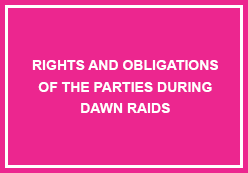
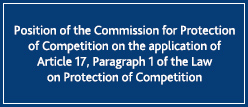
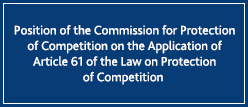
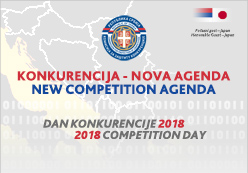
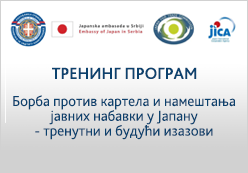


 The Commission for the Protection of Competition in cooperation with the Chamber of Commerce and Industry of Serbia (CCIS) held a one-day presentation of the Guidelines for the development of a business compliance program with regulations on the protection of competition in the Regional Chamber of Commerce of Moravica and Raška District – office in Čačak.
The Commission for the Protection of Competition in cooperation with the Chamber of Commerce and Industry of Serbia (CCIS) held a one-day presentation of the Guidelines for the development of a business compliance program with regulations on the protection of competition in the Regional Chamber of Commerce of Moravica and Raška District – office in Čačak. Pursuant to Article 47 of the Law on the Protection of Competition and the Decision of the Council, the Commission conducted a sectoral analysis of the state of competition on the market of other postal services.
Pursuant to Article 47 of the Law on the Protection of Competition and the Decision of the Council, the Commission conducted a sectoral analysis of the state of competition on the market of other postal services.